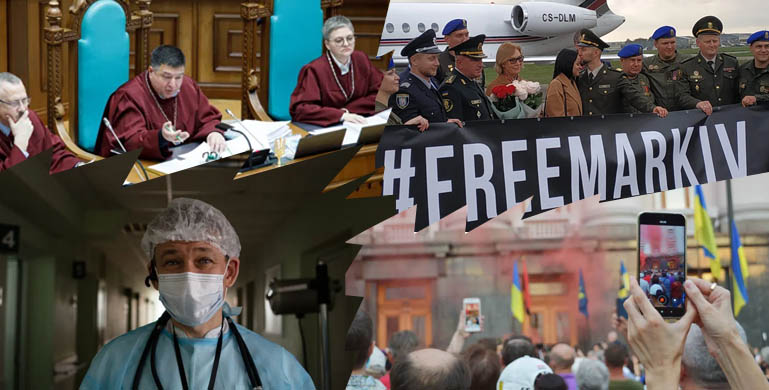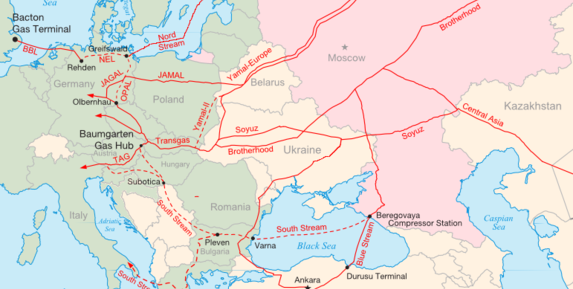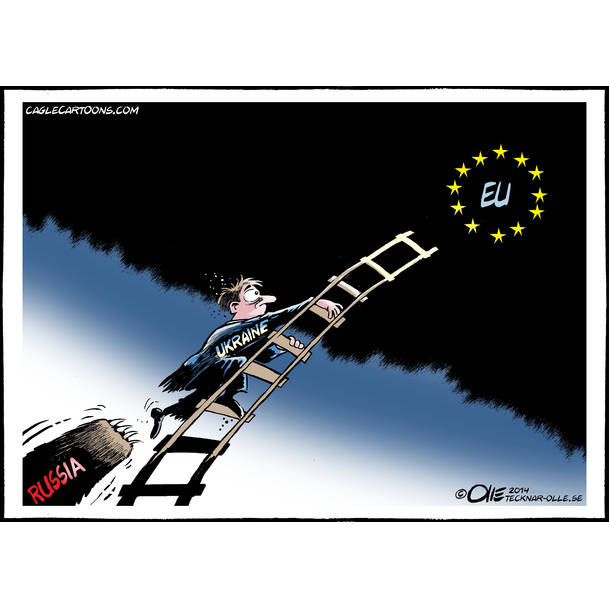In part one, I conceptualized the Hybrid War. I argued that it is a long term strategy, aimed at ensuring victory through parallel and synchronized use of military and non-military means.
The strategy does not envisage a military defeat. It is, on the contrary, designed to avoid a confrontation with the West while ensuring victory through the limited use of military power. Still, military power is an essential element of the Hybrid War. The threat of or the limited use of force has a huge impact across society and contributes to destabilizing the country from inside.
In this article, I will describe a defeat caused by Hybrid War, indications and warnings, and the potential consequences for Europe.
What does defeat look like?
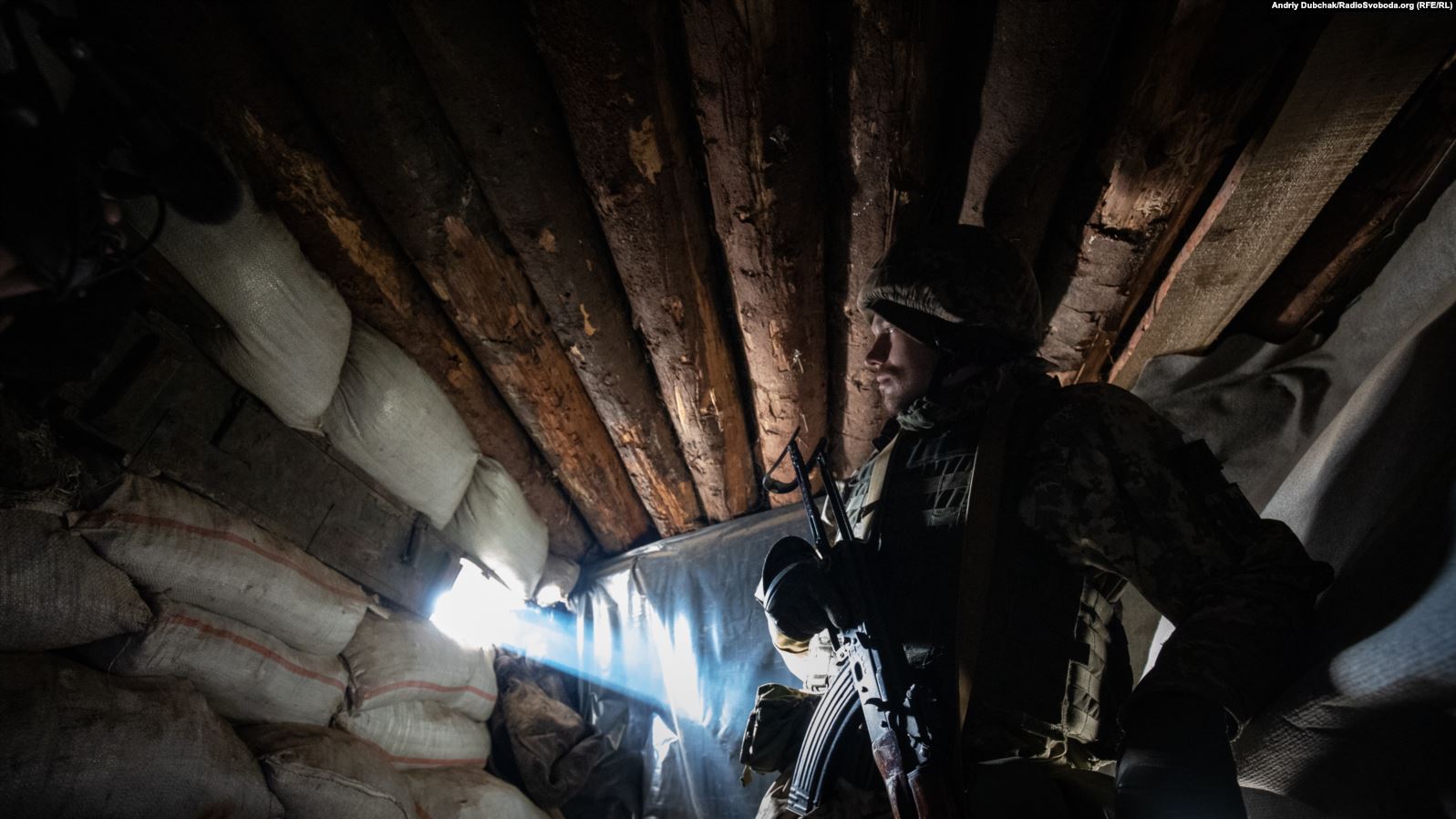
A conventional war will bring about a vastly different defeat than a Hybrid War. Iraq suffered the former. It experienced a temporary occupation, where its security and defense sector were both defeated and dissolved.
If Ukraine suffers a Hybrid defeat, none of that would transpire.Ukraine would still have an internationally recognized government. It would, however, either be pro-Russian or a government who has capitulated to Russian pressure.
Ukraine would be defeated politically, not militarily. It would still be a “sovereign” state (alas controlled from Kremlin). The personnel serving in the Security and Defence sector would still be serving Ukraine.
Ukraine would, therefore, still have an internationally recognized government. It would, however, either be pro-Russian or a government who has capitulated to Russian pressure. Both would ensure Russian control over Ukrainian politics and foreign policy.
This would lead to new political alliances in the parliament, constitutional changes, the end of reforms, a reshuffle of leadership within all sectors, and ultimately, a new strategic trajectory.
- Fulfill the political element of the Minsk Protocol, including the demand for a federalization of the regions,
- Return to the Russian sphere of influence,
- Reverse all legal processes initiated to hold Russia accountable for the war.
It would both remove the basis for international sanctions as well as reopen the door for what many perceive to be a normalization between Russia and the West.
That this would come as the result of Russian aggression, coercion, and manipulation would have no impact on the outcome. It would be the perfect killing of a liberal democracy by an authoritarian regime.
Indications and Warnings
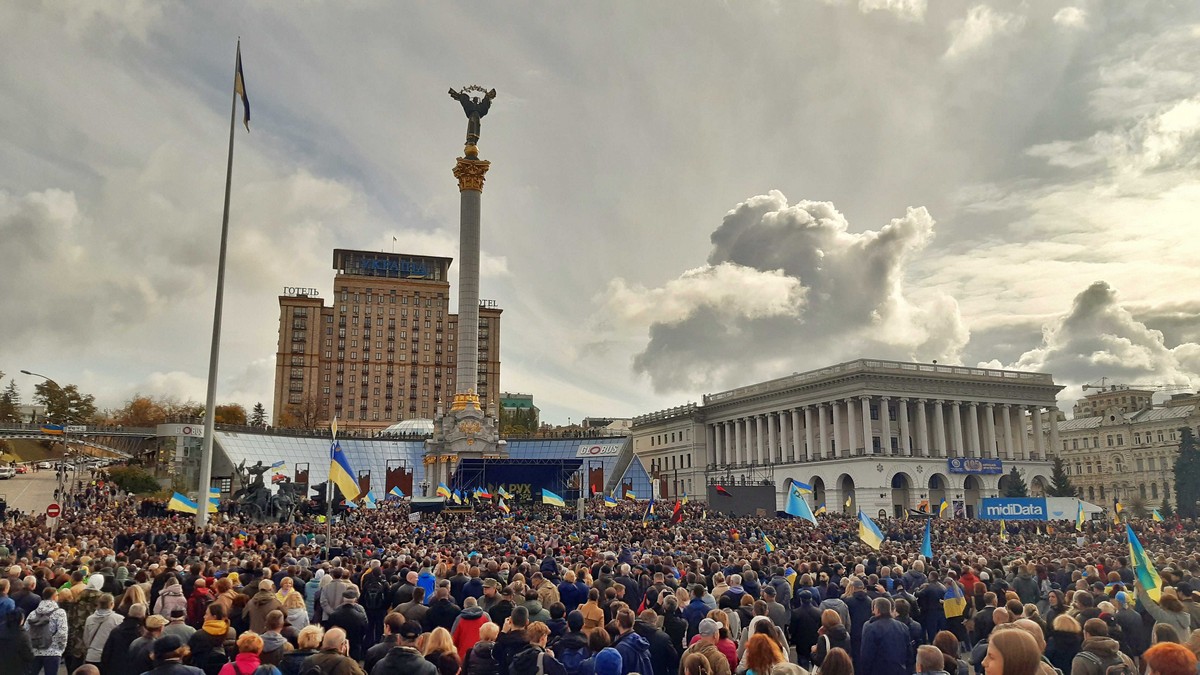
A sudden U-turn and change of strategic trajectory would inevitably trigger civil protests, demonstrations, and ultimately, another Euromaidan. This might result in the president and government being ousted.
The preparations for a defeat would, therefore, most likely be as gradual and long-term as the Hybrid War itself.
The preparations could include:
- An information campaign to establish public support for an alternative strategic direction,
- Discrediting and revanchism against pro-western politicians,
- Attacks on civil activists and non-governmental organizations,
- Change of leadership in ministries, national security and defense sector, state enterprises and agencies,
- A declaration of neutrality or non-alignment in exchange for “peace and stability,”
- Transfer of control of the National Guard to the president,
- Constitutional “reforms,” including:
-an increase of internal forces power,
-a gradual increase of control over media and social networks,
-infringement of basic civil and political rights such as privacy and the freedom of thought, speech, religion, press, assembly and movement, the right to a fair trial and due process, and more.
Russia will have achieved its ultimate end-state when Ukraine has fully turned away from the present pro-European and Euro-Atlantic trajectory and elected to enter an alliance with Russia, and its victory is secured.
Consequences for Europe

Ivanna Klympush-Tsintsadze, former Deputy Prime Minister of Ukraine recently stressed:
“need to be very clear about the fact that there can be no successful Europe without a strong and independent Ukraine. We also need to recognize that standing up to Moscow’s aggression is not about defending Ukraine; it is a matter of defending Western values. We must acknowledge that Moscow is not just targeting Ukraine; it is targeting Western democracies collectively, along with the entire post-1991 international status quo, which Moscow regards as a historical injustice. ... The Kremlin will not stop unless it is stopped. If the international community gives up on Ukraine, then the Baltic states, Poland, Italy, Austria, and other EU countries will be next in line. Key international institutions including the European Union and NATO will be at even greater risk.”
I will try to explain why.
The rise of “Great Russia”
Russia is already confident enough to start wars to change borders in Europe, attempt a coup in Montenegro; conduct multiple cyber-attacks against Western nations; meddle in several referendums and elections; assassinating (or attempt thereof) of Russian individuals abroad, and conduct influence operations across Europe.
A Russian defeat of Ukraine will mark the rise of “Great Russia” in both physical and psychological terms.
Firstly, it would happen because the West allowed Russia to defeat Ukraine. The tools we selected to coerce Russia into cooperation – being the same the West always applies – would once again have been proven impotent. Neither sanctions, (temporarily) diplomatic isolation, dialogue, international condemnation nor military measures would have stopped Russia.
Russia recognizes that if it is commercially attractive today, it will become even more so as “Great Russia” (Russia, Belarus, and Ukraine) with a population of nearly 200 million people. President Putin has even argued that
“… any integration of Russia and Ukraine, along with their capacities and competitive advantages would spell the emergence of a rival, a global rival for both Europe and the world. No one wants this. That's why they'll do anything to tear us apart.”
A Russia “reconnected” to its past economic marked, with a revamped defense industry, controlling a bigger part of Europe’s supply of both energy and agricultural product, an emerging IT industry, while simultaneously dominating both present and emerging shipping lane between Europe and Asia (Eastern Mediterranean and North-East Passage), will emerge more self-confident than ever.
It will emerge as the global power it always aspired to be, partner to the US and China only. Being a nuclear power already, Russia will also have a modernized, battle-hardened and reinforced conventional force, capable of operating effectively under the Hybrid War concept.
Russia will emerge stronger at the cost of the West. We will have emboldened and enlarged an aggressive nation with great power ambitions. Russian self-confidence will be a consequence of both strategic wins and a restored and tested military power, as well as a perception of a West in decline.
Geostrategic impact
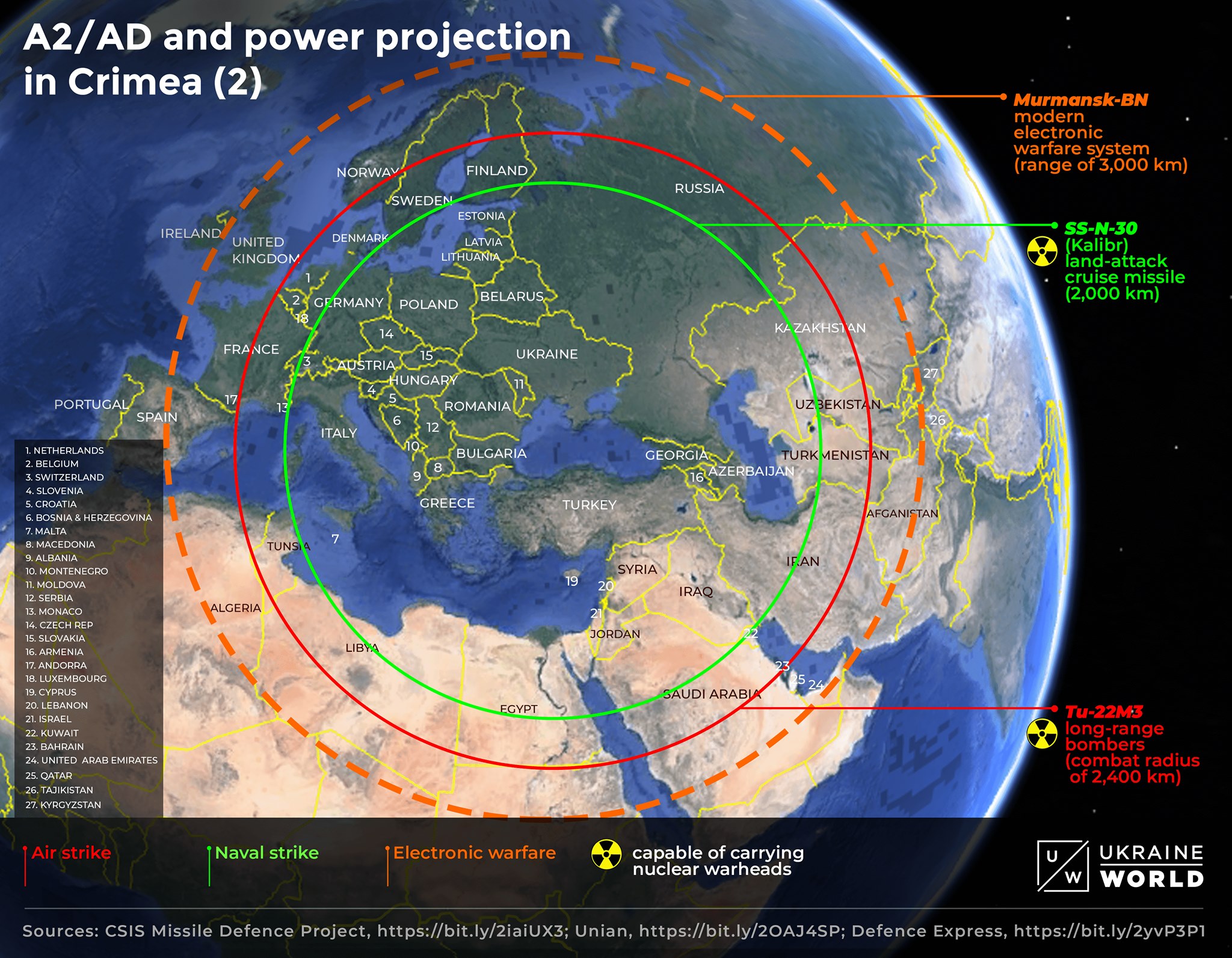
After Russia, Ukraine is the second biggest country in Europe. It is 603.628 km2 and is nearly as big as Germany and Poland combined. A Ukrainian defeat would, therefore, have grave geostrategic consequences.
The illegal annexation of Crimea has already secured Russia’s ability to project power towards the Middle East, the Mediterranean, the Caucasus, and Europe.
Ukraine subjugated to Kremlin will go a long way in establishing the Black Sea as a “Russian lake.” At the same time, this will effectively reduce future threats to its sea control.
The Russian military has become much more capable since 2008 as a “result of substantial increases in expenditures on military programs and forces, as well as a focus on readiness, organization, fielding modernized weapons, and updating tactics and doctrine.” Russian warfighting in Georgia, Ukraine, and Syria has supported the development.
According to RAND,
“Russian Ground Forces have local dominance along its European and Central Asian borders. Of great concern to Russia’s neighbors and to NATO are Russia’s enhanced capabilities to invade and hold territory in neighboring countries on short notice... Key investments in lighter and more mobile armor, ground-based missile, and long-range fire systems, and electronic war and cyber capabilities have turned the Russian military into a highly mobile unit in Europe capable of conducting “combined-arms maneuvers at the formation level” that “pose serious challenges to US or NATO units in a conventional conflict.”
This must be seen in the context of the change in the NATO force structure after the end of the Cold War, resulting in a reduction in its inventory of main battle tanks and artillery. Additionally, Russia has maintained its sustainability, resilience, and strategic mobility while developing supporting capabilities (e.g. ordnance, active and passive protection, UAV, EW, and more).
[highlight]Achieving indirect control over the Ukrainian Security and Defence sector, Russia could potentially gain control of one of the biggest, most experienced, and battle-hardened Land Forces in Europe.[/highlight]
It includes the modernized and partly reformed Army, Marines, National Guard, and the Special Operating Forces. Ultimately, its combined Security and Defence sector could increase by as many as 510.000 men and women. The Armed Forces and National Guard of Ukraine alone consist of 250.000 soldiers. In real terms, the Russian gain would, however, probably be far less. More about that later.
The 8th, 58th, and 49th
Combined Arms Army and 22nd Army Corps of the Southern Military District of the Russian Forces would not only be reinforced, but its area of responsibility would also border to Romania, Moldova, Hungary, Slovakia, and Poland.
The A2/AD concept is aimed at both limiting NATO's freedom of movement while exploiting NATO vulnerabilities. In a time of conflict, the capability in place could impact NATO's ability to deploy forces into and its ability to operate in the area. Increasing the costs associated with bringing in reinforcements to allies, it could potentially undermine the alliance's political decision-making process.
It would cover Bulgaria, Romania, Slovak, Hungary, the Czech Republic, and Poland. This would to an extent both negate the NATO AirPower while ensuring Russian Land Forces freedom of maneuver.
The combination of a strengthened Land Force, the westward deployment of both Land Forces and A2/AD capacities, increased control of the Black Sea, permanent naval presence in the Eastern Mediterranean, and forces based in Syria constitutes a re-emergence of a military threat to NATOs southeastern flank. A threat that disappeared with the collapse of the Soviet Union.
Civil war and regional destabilization
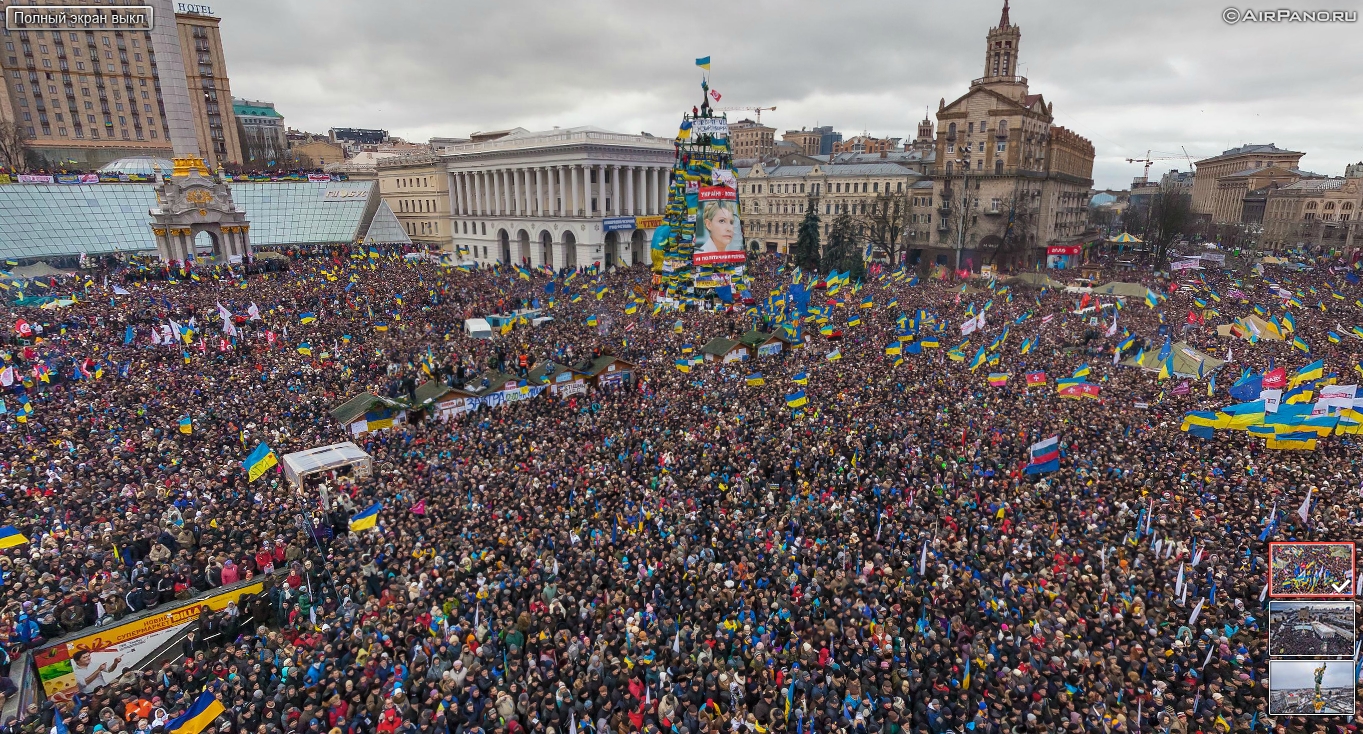
All of the above is a challenge to European security. The military impact is, however, mostly applicable during a time of tension or open confrontation between “Great Russia” and the West.
Regional instability will, on the other hand, have a dramatic, instant, and long-lasting impact on European security and stability.
Polls show that Ukrainians are not accepting peace at any price. Their red line remains unchanged. Seeing signs of further concessions at the peril of Ukrainian independence and sovereignty, and in the absence of trust between the state and its citizens, civil society is once again starting to mobilize.
Politicians, academics, activists, and civil society have already issued a petition to reverse what is seen as concessions during ongoing negotiations and proposed measures the government should adopt. Additionally, a clear warning has been issued to president Zelensky. Further concessions and harassment of the opposition will inevitably cause large-scale protests.If a compromise increases the risk of internal destabilization, a political defeat and subsequent strategic u-turn will set Ukraine on fire.
Consequently, if a compromise increases the risk of internal destabilization, a political defeat and subsequent strategic u-turn will set Ukraine on fire.
And herein lays the basis for a defeat turning into something worse.
Far too many Ukrainians have invested far too much into Ukraine aligning itself with the West. This includes three revolutions and a war. The war has so far resulted in more than 14 000 people killed, 27 000 wounded, about 2 million internally displaced persons or refugees and more than 3.4 million in need of humanitarian assistance. Ukrainians in Crimea have faced more than six years of serious violations and abuses of human rights, including extrajudicial killings, abductions, enforced disappearances, and politically motivated prosecutions.
The assessment is supported by the Russian Hybrid War itself, which aims to destabilize Ukraine from within. Its information campaign is based on the false narrative that the conflict in Donbas is a civil war and that the regions want increased autonomy. Ukraine is, according to President Putin, not even a state.
Russia has been trying to sow discord true economic hardship, political cronies, information campaigns exploiting regional differences, language, religion and ethnic diversity, and more. Even though its aggressions have had the opposite result, a political u-turn would tear the present Ukrainian unity apart.
[highlight]Three revolutions have demonstrated the readiness of Ukrainians to fight for their democratic values and universal civil rights (Revolution on Granite 1990, Orange Revolution (2004-05), and Revolution of Dignity (2013-14)). Civil society’s mobilization in 2014 demonstrated their willingness to mobilize and put up armed resistance against anyone threatening the independence and sovereignty of Ukraine.[/highlight]
In 2014, when Ukraine lacked the ability to defend itself against a full-scale military assault, more than 100,000 volunteers joined the 81-82 volunteer “battalions” which were hastily formed to stop the Russian attempt to destabilize Ukraine by force. 83% of the volunteers had “no military training, no combat or other military experience before joining.”
In the report “First on the Front Lines” published by ICDS, it becomes clear that the volunteers represented all of Ukraine, not only the western parts. A significant percentage of volunteers were native Russian-speaking. In addition, 75% were residents of central and southern Ukraine, while western and eastern Ukraine were equally represented.
Surveys conducted by Kyiv International Institute of Sociology (KIIS) between April 2014 and September 2015 indicated that the number willing to put up an armed resistance varied between 20,9 (south and eastern regions) and 23,8% (nationwide). A study published by Razumkov Centre in 2019, shows that the number remains more or less constant (21,4%).
Fighting the “enemy within” – the outcome of a Hybrid War – will probably rally fewer. For a nation that have undergone three revolutions in 31 years, mobilized volunteers to counter Russian aggression and having a population with an extraordinarily strong desire for a Western liberal democratic affiliation, the willingness to put up arms and fight or take part in civil resistance - such as demonstrations, protests, marches, boycotts, strikes, civil disobedience – should, however, not be underestimated.
[highlight]If only 2% of the adult population - a tenth of the numbers willing to resist a Russian invasion - chose to put up arms, Ukrainian authorities would face a partisan movement of more than half a million.[/highlight]
The numbers might be conservative. They would include parts of the 510 000 men and women serving within the National Security and Defence sector of Ukraine and most of the more than 400 000 veterans. Additionally, part of civil society would be willing to resist a president and government crossing the red line and conducting, in the view of the Ukrainian majority, high treason.
It should be noted that Ukrainian partisans fought the Soviet forces for around 10 years after the end of World War II.
War is devastating for any nation. It kills, but its consequences extend far beyond direct deaths, including forced migration, refugee flows, and the destruction of societies’ infrastructure. But the consequences of civil war for development are especially profound: some scholars have argued that civil wars are liable to be more damaging than international wars.The flow of refugees, the consequential deprivation and criminality, the loss of agricultural trade from “Europe’s breadbasket” would all have a huge impact on both European security and stability.
It becomes even more so when external parties are actively fuelling the conflict. The Spanish Civil War (1936-39) is one tragic historical example. If Russia were to succeed in instigating a civil war in Ukraine, it would remain an active part to ensure an outcome beneficial to its overall strategic interests.
The flow of refugees, the consequential deprivation and criminality, the loss of agricultural trade from “Europe’s breadbasket” would all have a huge impact on both European security and stability.
Ironically, it might have the exact opposite effect on Russia. I will explain why in my next article “Spoils of War."
Conclusion
In my two articles, I conceptualized the Hybrid War, described what a defeat would look like, suggested indications and warnings, and lastly, outlined the potential consequences for Europe if Ukraine is defeated.
I have argued that the Hybrid War is not fought in Donbas only. It is an ongoing, continuous battle for influence across Ukraine, involving both military and non-military means while targeting key decisionmakers, political leaders, and the population. While all attention is focused on the defense against a military threat in Donbas, the Hybrid War might cause Ukraine to de defeated in Kyiv.
[highlight]The single-minded focus on the military element of the Hybrid War is a grave mistake as it denies the international community the ability to effectively solve the conflict and counter the threat.[/highlight]
The population has decided Ukraine’s path. Lasting peace is not possible without taking due consideration to their demands and expectations. Never. If the President of Ukraine and the government crosses the red line and gives in to Russian pressure and coercion, civil war is a likely outcome. Civil society has already demonstrated extraordinary resilience and readiness to fight for both its civil rights as well as Ukrainian independence and sovereignty.
- It would ensure that Ukraine would not turn in to liberal democracy and a model for the Russian society to follow suit;
- The present effort to destabilize Ukraine from within would have succeeded, allowing Russia to distance itself from the evolving civil war;
- The spillover effect would further weaken the West, increasing the likelihood of “grand bargaining”;
- It would justify a Russian intervention either upon request from Ukrainian authorities or protect Russian speaking citizens.
If Ukraine is politically defeated and civil war is the outcome, the consequences for both Ukraine and Europe will be devastating. If EU/NATO find the consequences “acceptable” and in line with the national interest of the individual nations, there is no need to adapt their present strategy.
If unacceptable, the West needs to adjust its strategy to the realities of the Hybrid War.
[highlight]It needs to counter the “parallel and synchronized use of military and non-military means to destabilize the enemy from within.”[/highlight]
Recommendations
The Hybrid War is in a sense like a pandemic. Lacking a resolute response and extreme measures, it is bound to spread.
It is time for the West to change its strategy towards Russia. Hybrid War can only be countered by Hybrid Defence.
We must not only be prepared to defend our independence and sovereignty, but also our core values and principles.
In order to ensure an effective defense across all sectors (military and non-military alike), the West’s total resources must be mobilized. This encompasses the use of diplomatic, political, energy, economic, informational, religious, legal, security, and military instruments.
The international peace effort must be based on the same principles.
It is, however, becoming increasingly important for Ukraine to complete the many crucial and outstanding reforms that will both help counter the effect of the Hybrid War and align the nation to Europe.
Read also:
- Part 1 of this series: What if? Hybrid War and consequences for Europe
- Hybrid War in Ukraine – predictions for 2019 and beyond
- Leaked Kremlin emails show Minsk protocol designed as path to Ukraine’s capitulation – Euromaidan Press report
- Experts urge to scrap term “Minsk Agreements” as they are not a treaty, use “Protocols” instead
- What Surkov’s hacked emails tell about Russia’s hybrid war against Ukraine
- The basis for a peaceful resolution of the war in eastern Ukraine – trends at the end of 2019
- The Surkov Leaks: Major report on Russia’s hybrid war in Ukraine published at RUSI Institute



